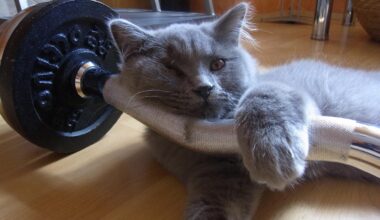Nutrition Essentials for Bull Terriers
Bull Terriers are known for their strength, playful nature, and unique appearance. To keep a Bull Terrier happy and healthy, nutrition plays a critical role. An appropriate diet should be rich in high-quality protein to support muscle growth and energy production. It’s recommended to choose commercial dog food that lists meat as the first ingredient. Look for formulations specifically designed for active breeds and avoid fillers like corn and wheat. Another important component of their diet is fats, which provide essential fatty acids necessary for overall health. Fish oil is an excellent source of omega-3 and omega-6 fatty acids. Additionally, fruits and vegetables can be included in moderation. Dogs appreciate flavors like blueberries and carrots, which offer vitamins and antioxidants. Adequate hydration is crucial, so ensure that fresh water is available at all times. Monitor their body weight and adjust feeding portions accordingly. Conclusive evaluations can also be made with the help of your veterinarian; regular check-ups can optimize their health. Always remember, feeding your dog an appropriate diet can help prevent various health issues later on.
Considering the age and activity level of a Bull Terrier is essential when determining their diet. Puppies have different nutritional requirements compared to adults. Ensure that puppy food designed for large breeds is offered to support optimal growth during their early stages. Once they reach adulthood, switch to a maintenance diet. Adults need fewer calories relative to their size. Active breed formulas will cater to a Bull Terrier’s high energy levels, but avoid overfeeding to prevent obesity. Bull Terriers that engage in regular physical activity can require an increase in caloric intake. A proper balance must be maintained to avoid excess weight, which can lead to joint issues and other health problems. It’s essential to assess whether your Bull Terrier is maintaining a healthy weight. You should be able to feel but not see their ribs. Additionally, consult with your veterinarian about the ideal body condition score for your specific pet. A balanced diet is central to a Bull Terrier’s health, energy, and happiness. Being proactive about their nutritional needs ensures a long and enjoyable life together.
Understanding Nutritional Needs
Bull Terriers, with their active lifestyle and robust build, require a well-rounded diet focusing on specific nutritional needs. A diet high in protein is essential due to their energy levels and muscular structure. Common protein sources include chicken, beef, and fish. Choosing dog food with a protein content of at least 20% is advisable, especially for junior Bull Terriers. Fats are another key component, providing energy and enhancing nutrient absorption. Healthy fats from sources like chicken fat or fish oil are beneficial for skin and coat health. Carbohydrates also contribute energy but should come from whole grains and vegetables rather than fillers. Maintaining a balance between protein, fats, and carbohydrates will help support their vitality and health. Additionally, vitamins and minerals are crucial to their overall wellness. Calcium and phosphorus contribute to strong bones and teeth, while antioxidants support the immune system. Avoid poisonous foods like chocolate, grapes, and onions, which could lead to serious health complications. Taking the time to educate oneself on these dietary necessities ensures your Bull Terrier remains active and enjoys a long, healthy life.
Portion control is another critical aspect of feeding Bull Terriers. Regular meal timings and measured amounts reduce the risk of digestive issues and maintain energy levels. Most Bull Terriers thrive on two meals a day, spaced evenly apart to prevent hyperactivity. Read the packaging of commercial dog food for guidelines on serving size based on their weight and activity level. Adjust quantities as necessary based on regular activity, physical condition, and your vet’s advice. Making sure that Bull Terriers don’t become accustomed to human food is equally important. Many owners mistakenly indulge their pets with table scraps, which can be harmful. Not only does this contribute to obesity, but certain human foods can cause digestive troubles and toxicity. Instead of human food, consider giving treats specifically designed for dogs. Use these treats as rewards for good behavior or during training exercises and positively reinforce healthy habits. Additionally, make sure not to leave food out all day. Free-feeding can lead to overeating; consistency in feeding times helps manage body weight and can keep a Bull Terrier mentally stimulated and healthy.
Identifying Food Allergies
Just like humans, Bull Terriers can develop food allergies or intolerances. It’s essential to identify and manage any adverse reactions to specific ingredients in their diet. Common allergens include beef, chicken, dairy, wheat, and corn. Signs of food allergies may include itching, skin irritations, ear infections, and gastrointestinal issues. If you suspect your pet is struggling with food allergies, consult a veterinarian. They may recommend an elimination diet to pinpoint the specific allergen. This process involves feeding a novel protein and carbohydrate source not currently included in their diet for several weeks. After this stage, foods can be gradually reintroduced one by one to identify the trigger. Keeping a detailed record of their food intake and any reactions significantly aids in diagnosis. Additionally, consider hypoallergenic or limited-ingredient diets. These products can often alleviate symptoms with fewer components, minimizing potential irritants. Regular veterinary check-ups can ensure that you are on the right path toward improving your Bull Terrier’s health. Monitoring their health and diet actively keeps allergies in check and promotes a better quality of life.
Ultimately, a Bull Terrier’s overall health largely depends on the balance of their nutrition and lifestyle. Engaging them in daily physical activity contributes to their mental and physical well-being, alongside proper nutrition. Being active reduces behavioral issues stemming from boredom and excess energy. Aim for at least an hour of exercise each day, mixing activities like walking, running, and play to keep them engaged. Training sessions can double as a bonding time while reinforcing healthy behaviors. It’s essential to establish a regular schedule for feeding, exercise, and playtime to provide a sense of stability for your Bull Terrier. When it comes to feeding, always choose high-quality commercial dog food over generic brands. Look for brands that rely on veterinary research and clear labeling. Understanding special dietary needs during certain life stages or medical conditions is also vital. Whether it’s knowing when to transition from puppy food to adult food or when to consider senior diets, each transition should be handled carefully. This proactive approach ensures that your Bull Terrier remains vibrant and healthy throughout their life cycle.
The Role of Supplements
Besides a well-rounded diet, certain supplements can further enhance a Bull Terrier’s overall health and wellness. Common supplements include omega fatty acids, glucosamine, and probiotics. Omega-3 and omega-6 fatty acids promote healthy skin and coat, which is important for this breed, known for its distinctive appearance. Glucosamine is beneficial for joint health, particularly in older dogs; it supports cartilage and helps in reducing inflammation. Probiotics play a significant role in digestive health, ensuring that nutrients are effectively absorbed while promoting gut health. It’s always advised to consult your veterinarian before introducing any supplements to your dog’s diet. They will help you understand your pet’s unique needs based on its lifestyle and health status. Over-supplementing can sometimes lead to adverse reactions or imbalance, so careful consideration is needed. Complete, balanced nutrition should always be the foundation of your Bull Terrier’s diet; supplements act as an additional support tool. Regular consultations with your vet will help maintain optimal health and apartment properly for your pet’s unique needs.
Veterinary check-ups should include discussions about nutrition and diet adjustments as Bull Terriers grow. Working closely with a vet allows pet owners to navigate the sometimes-confusing landscape of pet nutrition while avoiding potential pitfalls. Each Bull Terrier will have individual dietary needs; understanding these can make a huge difference in growth, vitality, and behavior. A long-term commitment to quality nutrition and proper feeding practices positively influences their overall well-being. Always remember to rely on reputable resources and remain vigilant about any emerging health issues or dietary needs. As pets age, constant adjustments to their diet may be necessary to meet changing health needs. Practicing portion control and adjusting feed types ensure that Bull Terriers remain healthy and balanced throughout their lifetime. Emphasize maintaining a clean feeding area and fresh drinking water without restrictions. This way, your pet has sustained energy during play and rest. The right nutrition not only influences their physical stature but also their mood and behavior. Investing time and effort in their dietary requirements ultimately results in an enriching and fulfilling relationship with your Bull Terrier.


